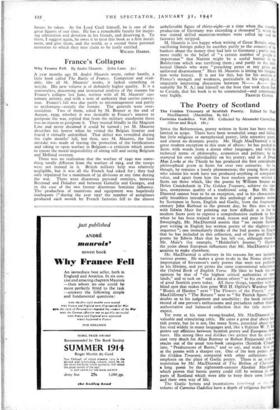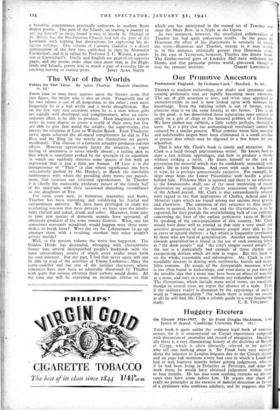The Poetry of Scotland
The Golden Treasury of Scottish Poetry. Edited by Hugh MacDiarmid. (Macmillan. 8s. 6d.) Garmina Gadelica. Vol. III. Collected by Alexander Carmichael (Oliver and Boyd. ISS.) SINCE the Reformation, poetry written in Scots has been strictly limited in scope. There have been wonderful songs and ballads, but little religious or metaphysical poetry,- little narrative poetry, and almost no dramatic poetry. Mr. Hugh MacDiarmid is the great modern exception to this state of affairs : he has packed bn Scots with words from a dozen other languages, and with the technical terms of philosophy, economics and politics; he has stamped his own individuality on his poetry; and in A Death Man Looks at the Thistle he has produced the first considerable philosophical poem in Scots for over two centuries. So far, though, he remains a lonely phenomenon; the young Scots poets who admire his work have not produced anything of comparabk value, and apart from him the best modern poems written el Scots are those which, like the poems by William Soutar and Helen Cruickshank in The Golden Treasury, achieve the time- ltss, anonymous quality of a traditional song. But Mr. Mac- Diarmid cannot bear to be an exception and in his characteristi- cally breathless introduction to this anthology of poems wrina by Scotsmen in Scots, English and Gaelic, from the fourteenth. century John Barbour to the present day, he flies into a raft with Edwin Muir for pointing out how difficult It is for the modern Scots poet to express a comprehensive outlook in Scots when he has been trained to read, reason and pray in English Sweepingly, Mr. MacDiarmid asserts that "no recent Scottish poet writing in English has written poetry of the slightest coo- sequence "; one immediately thinks of the bad poems in English that he has included in this collection, and of the good English poems by Edwin Muir that he has left out although many d Mr. Muir's (for example, ".Holderlin's out, ") illustrate the point about European influences that Mr. MacDiarmid is F anxious to make elsewhere.
Mr. MacDiarmid is arbitrary in his reasons for not includil various poems. He makes a great to-do in the Notes about the importance of Stevenson's early poems that were not publishd in his lifetime, and yet prints the same conventional selection the Oxford Book of English Verse. He likes to back his o opinion by that of "the highest critical authorities of lands," and to tack on "and a dozen others" to his enumerat of good Scottish poets today. All these things, together with blind spot that makes him print Will H. Ogilvie's Wardour S "Blades of Harden" next "The Flowers of the Forest," and MacGillivray's "The Return" next to "Sir Patrick Spens," doubts as to his judgement and sensibility : the book remains record of one person's enthusiasms and prejudices rather than authoritative and balanced collection that the title makes expect.
Yet even at his most wrong-headed, Mr. MacDiarmid IS valuable and stimulating critic. He cares a great deal about S tish poetry, but he is not, like many Scots, parochial about it has read widely in many languages and, like a flightier W. P. -IC points out affinities between Scottish poetry and European li tures. His strong likes and dislikes (we gather that he does care very rimch for Allan Ramsay or Robert Fergusson) jerk reader out of the usual text-book categories (Scottish Cha inns, "Predecessors of Burns," and so on), and make him at the poems with a sharper eye. One of the best points a the Golden Treasury, compared with other collections. is emphasis on the place of Gaelic poetry. There is an exce translation by Mr. MacDiarmid of The Birlinn of Claw long poem by the eighteenth-century Alasdair Macdo which proves that' heroic poetry could still be written in parts of Scotland which were able to keep their own Ian and their own way of life.
The Gaelic hymns and incantations trar.tclested tn the I. volume: of Carmina Gadelfea have a depth of religious feeling
a beautifui concreteness practically unknown in modern Scots dialect poetry. The poet of the Islands, on starting a journey or sett:ing himself to sleep, found it easy to invoke St Michael or St. Brigit; but the Presbyterian Church had left the poet of the Lowlands with nothing but abstractions for expressing his re- ligious feelings. This volume of Carmina Gadelica is a direct continuation of the first two, published in znoo by Alexander Carmichael, and it is edited by Professor J. C. Watson, a grand- son of Carmichael's. Gaelic and English are printed on opposite pages, and the poems make clear once more that, in the High- lands and 'Islands, poetry was as much a part of everyday life as































 Previous page
Previous page